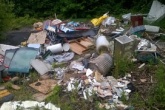Guilty verdicts for illegally shipping mattress waste to Egypt
A man found guilty of running an illegal mattress disposal operation in Norwich that involved illicit shipment of waste to Egypt has been sentenced along with the owners of the site where the operation was based in a trial that concluded last week (28 March) at Norwich Magistrates’ Court.

In total, 471 tonnes of waste mattresses were found at the site on Salhouse Industrial Estate, nearly 100 times the amount allowed under the registered exemptions.
EA investigators visited the site in August 2015, following a report from a member of the public. The site was found crammed full of mattresses and mattress textiles, posing a serious risk to the environment, especially in the event of a fire. An expert found that fumes from a potential fire could contain toxic and harmful substances.
The illegal site had no environmental management system, no fire suppression system, no fire detection system, no dust suppression system, no litter prevention infrastructure nor sealed drainage system. Quinsey also admitted to not having any insurance or an official lease on one of the buildings used as part of the operation.
An enforcement notice was served to Quinsey, which he only partially complied with, removing some waste metals from the site. The court also heard how Quinsey found a company in Egypt to take some of the mattresses, shipping 27 bales of compressed waste illegally, without the required permits.
Quinsey cooperated with the investigation, admitting he didn’t contact the EA as he was worried his business would be closed down and he ‘hoped to resolve the situation himself’. He told investigators the business had left him in debt, having grown ‘too quickly’ and was aware it was ‘out of hand’.
During the investigation, the EA also contacted Salhouse Norwich Ltd and Mr Stone, submitting five requests in total for an action plan from the company, and advising they clear the site.
Stone claimed he was unaware that Quinsey’s operation was illegal. Speaking to investigators, he said Quinsey had informed him that he had the relevant permissions to carry out the waste operation. Stone made no attempt to verify his claims. He stated that his company had concerns about the fire risk and were “horrified” by the volume of waste on site, but did not ask Quinsey to cease operating for fear he would leave them to deal with the waste.
EA Investigator Lorraine Machin commented after the hearing: “We acted quickly to try to get the occupier and landowner to clear the site because of the environmental and fire risk, but the majority of the waste still remained on site.
“This case shows how important it is to ensure that any new operation has been fully researched, properly permitted and any site used is adequate for the operation.”
Stone and Salhouse Norwich Ltd will be sentenced on 5 May. According to local reports, Richard Dykes, chair of the bench said magistrates were contemplating a custodial sentence. 









